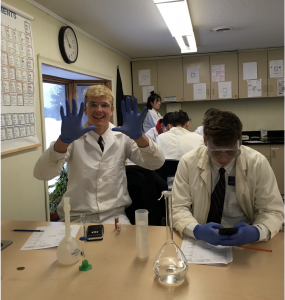 We ran our first real lab today. I decided within the first block, a spare period for me, that it was time and that they were ready. “Ready for what,” you ask? Ready to handle acidic (hydrochloric acid) and basic (sodium hydroxide) substances with enough care and professionalism so as not require a trip to the hospital. I know some teachers love risk, and in some settings a bit of calculated risk is a good thing, but it is 100% a liability in the chemistry lab. Pure chemistry is also something that you would rarely undertake outside; so many variables, so little control.
We ran our first real lab today. I decided within the first block, a spare period for me, that it was time and that they were ready. “Ready for what,” you ask? Ready to handle acidic (hydrochloric acid) and basic (sodium hydroxide) substances with enough care and professionalism so as not require a trip to the hospital. I know some teachers love risk, and in some settings a bit of calculated risk is a good thing, but it is 100% a liability in the chemistry lab. Pure chemistry is also something that you would rarely undertake outside; so many variables, so little control.
It was time. So I set about to creating some instructions and setting up each of six stations with the necessary materials. “What about open inquiry,” you say? Please see paragraph one (above) where I outline why we might need to be more careful than current educational approaches often suggest. My students are having their first real lab today, and if you ask them they will tell you, a bit of hand-holding is much appreciated. Based on Trevor Mackenzie’s model I would call this lab a guided inquiry lab.
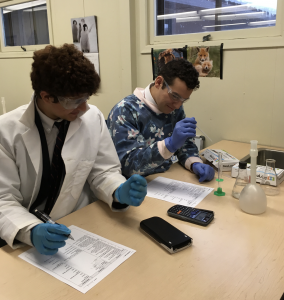 Because @gvogt has been encouraging us to take our classes outside once a week I have been feeling unendingly guilty for not doing so more often in chemistry. Truthfully, the Chemistry 11 University Preparation curriculum does not lend itself well to outdoor activities with that frequency. There is a reason why chemists continue to undertake their work in stodgy, old labs with black-topped benches. It is the safest way to conduct chemistry because “there is no such thing as the eyeball store.”
Because @gvogt has been encouraging us to take our classes outside once a week I have been feeling unendingly guilty for not doing so more often in chemistry. Truthfully, the Chemistry 11 University Preparation curriculum does not lend itself well to outdoor activities with that frequency. There is a reason why chemists continue to undertake their work in stodgy, old labs with black-topped benches. It is the safest way to conduct chemistry because “there is no such thing as the eyeball store.”
Because @gvogt has also reintroduced VOCAL, an initiative started by @edaigle last year, I realized that this was something that I could do, and so on the fly, I added an additional instruction:
Once you have an approved plan in your Calculations column, please voice or video record your thinking as a first step towards enabling me to assess you in ways other than via a written test.
There were some adorable yet scientifically accurate results from at least one of my groups. Take a listen to this recording.
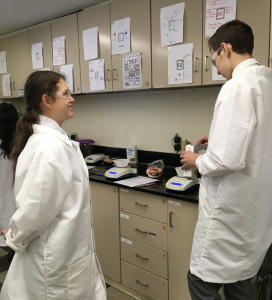 Because I was whipping this together at the last minute there were some errors on the handout. Students caught these errors and it simultaneously assured them that they know what they are doing when they talked it out with me (more COP conversation, yes!). There were also some stations that needed more materials than I had originally provided. This was an opportunity for students to notice the problem, tell me about it (with relish), and do something about it (more COP observation, yes!). We are far enough along in the semester that no one is scared to tell me that I am straight up wrong. It’s a fun stage to be at.
Because I was whipping this together at the last minute there were some errors on the handout. Students caught these errors and it simultaneously assured them that they know what they are doing when they talked it out with me (more COP conversation, yes!). There were also some stations that needed more materials than I had originally provided. This was an opportunity for students to notice the problem, tell me about it (with relish), and do something about it (more COP observation, yes!). We are far enough along in the semester that no one is scared to tell me that I am straight up wrong. It’s a fun stage to be at.
Because I never use Google to “search up” COP, and when I do I get a lot of information about the OPP, I want to give a shout-out to former Cohort 21 participant @melodyrussell for this blog post and the helpful triangle graphic contained within. Thanks, Melody.
A few times during my preparation for this lab, students in a neighbouring classroom shouted out “Mrs. Farooq” and I had to tell them to ask me another time, my own husband popped in to the lab to chat and I had to tell him to go away, and in general I had to buckle down and make it happen, which suggests that urgency is helpful, though possibly authentic urgency is key.
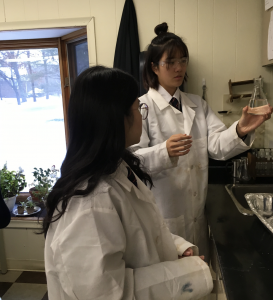 Now that I have a massive headache even though the lab was a resounding success you also need to know that the war on handouts and worksheets is totally unreasonable for science and math teachers. We cannot work like this every day. It would be too crazy to plan, set up, administer, troubleshoot, and tear down at the end, every single day. This is how I feel and I am the only one with classes in this lab classroom; imagine how crazy it would be if I had to share it with another teacher! The students had a lot of fun, but they too acknowledged how challenging it would be to do this every day.
Now that I have a massive headache even though the lab was a resounding success you also need to know that the war on handouts and worksheets is totally unreasonable for science and math teachers. We cannot work like this every day. It would be too crazy to plan, set up, administer, troubleshoot, and tear down at the end, every single day. This is how I feel and I am the only one with classes in this lab classroom; imagine how crazy it would be if I had to share it with another teacher! The students had a lot of fun, but they too acknowledged how challenging it would be to do this every day.
This opens up the concept of personalization at the teacher level. We should consider that blanket, school-wide requirements, if adhered to with utmost strictness, might detract from good quality teaching and learning in specialized junior and senior level classes. If I do use a worksheet or a handout, which I most certainly will, I would love for every educator to assume that I am doing it because it is what will help my students to know how to undertake chemical processes. It will never be pointless busy work! Thanks for reading.
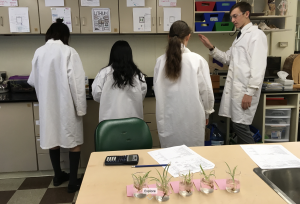
What an incredible journey here Leslie! And yes, the question you raise about handouts is a very relevant one – handouts can be useful, just as lectures can be. It is all in the context. Keep up the incredible work here!